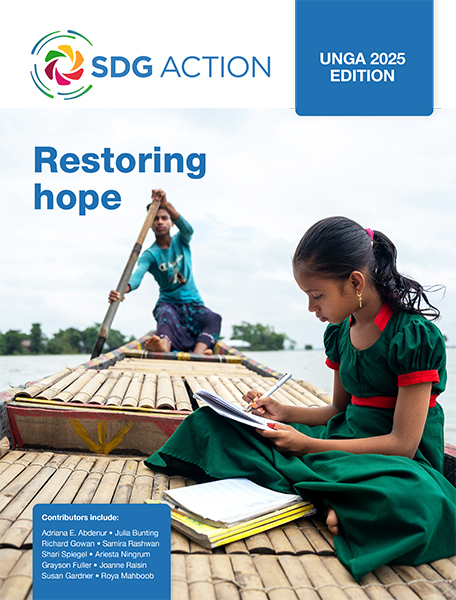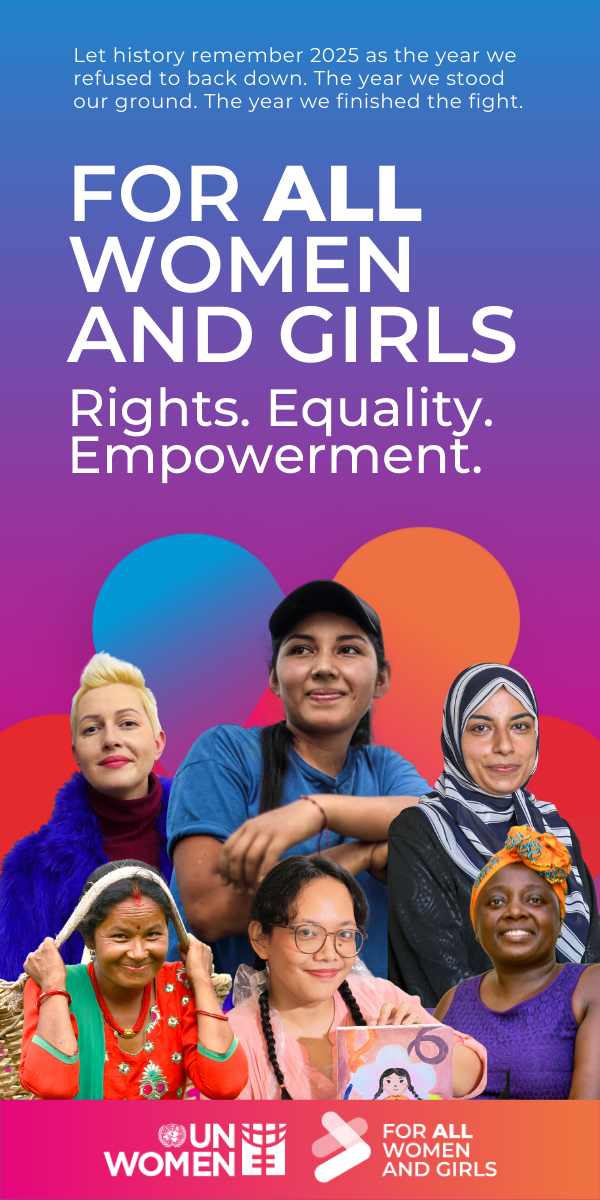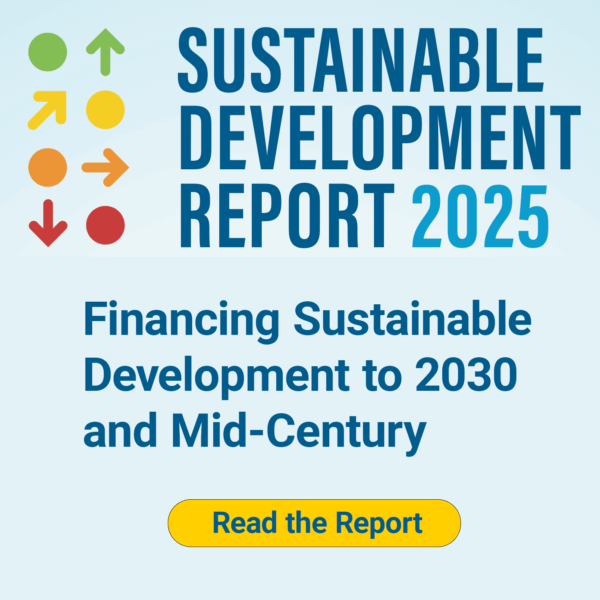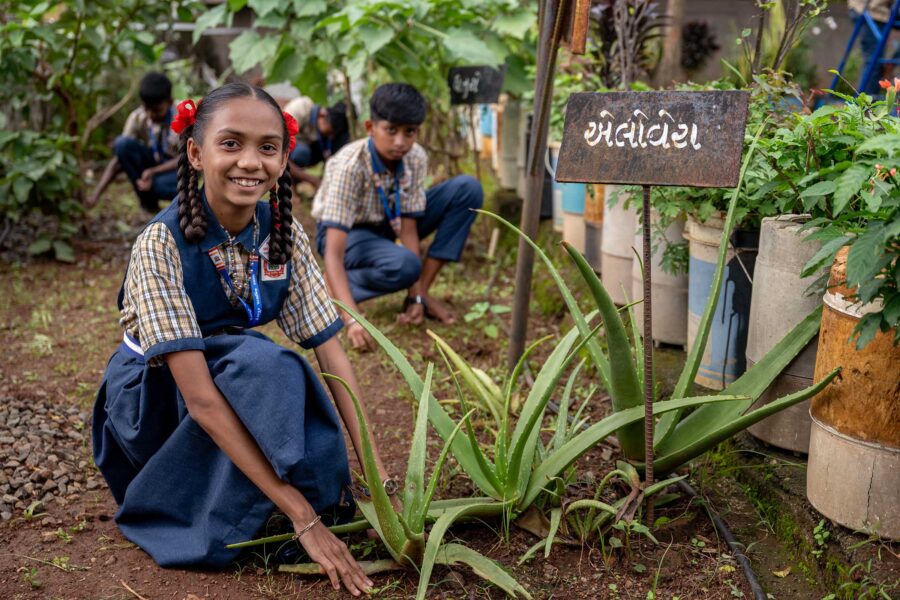Can the G20 bridge a fractured world?
As global power becomes more diffuse and traditional institutions lose traction, the G20 stands out as a forum with the potential to reconnect a divided international system. Its success will depend on whether member states can find common cause – and act decisively when others won’t
Global governance — Global
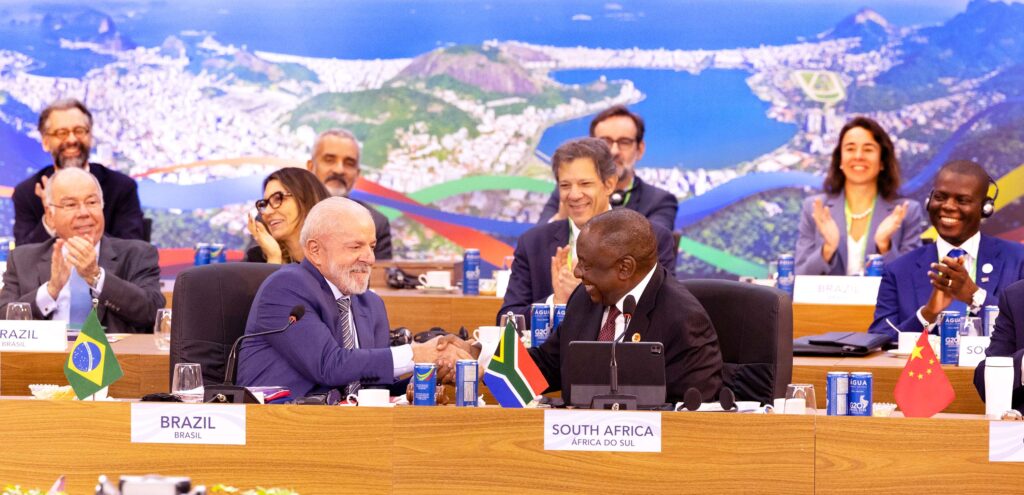
Uncertainty generates anxiety, but turbulence can sometimes sow the seeds of innovation – even reinvention. The world is experiencing rapid political and geopolitical shifts, compounded by the far-reaching impacts of the digital revolution. With increasing tensions between global powers, rising multipolarity, and a weakened UN system, the G20 remains one of the few platforms where major economies – both developed and emerging – can find common ground. Its role in fostering cooperation on key issues of global governance has become more, rather than less, vital.
South Africa, currently holding the G20 presidency, is navigating a delicate balance, advocating for African and developing country priorities while maintaining constructive engagement with Western economies. Its success hinges on two factors. First, it must identify and promote initiatives that appeal to all members – north and south, east and west – without watering down its core mission of “Solidarity, Equality, Sustainability.” Second, it must ensure that decisions are followed through by established organizations like UN bodies, multilateral development banks (MDBs), and other international finance institutions. If those ideas aren’t anchored within established structures or concrete initiatives, they remain nothing more than words on paper.
On the downside, South Africa faces a global context of heightened tensions, trade wars and rising neo-mercantilism. On the other hand, the broad scope of South Africa’s priorities, its bold diplomacy, and vibrant civil society provide opportunities to craft solutions that address global gaps and imbalances while promoting inclusive prosperity: win-win ideas.
The burden is not South Africa’s alone – it is shared by all of the grouping’s members. The G20 is more than the sum of its parts. Although communiqués are set through consensus, the momentum generated around specific topics is difficult to torpedo by any single member, especially when backed by robust engagement by the associated non-state groups (T20, B20, Y20, etc). Therefore, the agenda can be shaped by coalitions of members willing to lead on critical global issues. Countries with the capacity and political will to bridge vastly different economic and geopolitical interests will have to prepare for a broad range of scenarios and seize windows that may open up.
Moreover, the importance of the G20 over time extends beyond any single presidency. Following South Africa, the United States is set to take the helm of the grouping. Washington’s approach – whether collaborative, confrontational, or disengaged – will influence whether the G20 remains a viable forum for global cooperation in the short to mid-term or fractures along geopolitical lines.
Financing for development, climate action, governance of artificial intelligence (AI) and global inequality are among the critical areas where the G20’s leadership is urgently needed – not only to ensure shared prosperity, but also global stability. All these issues demand both immediate responses and long-term paradigm shifts – as well as action at scale, which a grouping of the world’s 20 largest economies can catalyze. Moreover, progress can gain momentum from the sequence of major global events on these topics this year – not only major AI conferences, but also the midyear Finance for Development summit in Seville, and COP30 in Belém.
Financing for development
On finance for development, the G20 must move beyond vague commitments to “unlocking trillions” in private finance and instead implement concrete mechanisms to direct capital flows effectively – including for addressing poverty, hunger, and critical needs in infrastructure and productive capacity. MDBs must reform their lending models to support sustainable development, green infrastructure, and manufacturing – not just climate mitigation – without burdening developing countries with (even more) unpayable debt. They must play a countercyclical role for all countries, not just advanced economies. In many of the member countries, national development banks can play a catalytic role by providing long-term financing and coordinating public and private stakeholders to drive projects (including infrastructure) that align with social inclusion, sustainability, and economic growth.
This requires reaching beyond the list of Sustainable Development Goals. The SDGs remain crucial for setting measurable targets and fostering international cooperation, but they do not fully capture the broader objective of promoting structural transformation. Achieving sustainable development requires not just incremental progress toward individual goals, but also a comprehensive overhaul of economic systems, power relations, and governance structures. Structural transformation of economies, including through green industrial policy, will not only reduce reliance on foreign aid but also foster job creation, sustainable growth, and economic and political stability.
Ultimately, the move toward a new economy – one that is more sustainable, inclusive, and resilient – will benefit not only developing countries, but advanced economies as well.
This shift cannot be achieved without addressing fiscal constraints in developing economies. Without additional fiscal space, those countries will lack the ability to implement long-term development strategies, address climate and biodiversity challenges, or transform their economic structures. Dozens will remain mired in unpayable debt. The G20 should support member states in designing their own fiscal strategies – whether through progressive taxation, sovereign wealth funds, tailored financial sector reforms, or repurposing of public procurement budgets for strategic investments.
One aspect of this transformation involves strengthening domestic resource mobilization as a complement to grants, and without imposing externally driven or outdated models that fail to reflect local realities or to respond to concrete demands. By supporting policies that strengthen domestic resource mobilization based on national priorities and local voices, the G20 can help ensure that development finance drives sustainable growth and economic resilience, creating local opportunities rather than reinforcing financial dependencies.
Additionally, the G20 must address external factors that drive up the cost of capital disproportionately for developing countries, including specific practices by credit rating agencies that need updating. It can mandate the Financial Stability Board to undertake a comprehensive review of the policies and norms implemented in the aftermath of the 2008 financial crisis. Many of these measures, while well-intentioned, have had unintended consequences that are now hindering economic growth and resilience. Developing countries, in particular, continue to face disproportionately high costs of capital, not solely due to their domestic conditions, but also because of global financial regulations and practices that overly penalize perceived risk rather than incentivize productive investment. This is not only a pressing concern for developing nations striving for sustainable growth, but also for the private sector, which suffers from constrained investment opportunities and inefficient capital allocation. Advanced economies, too, have a vested interest in such a review, as distorted capital flows and market fragmentation can undermine global financial stability and exacerbate systemic risks.
South Africa can also build on the leadership of the African Union, civil society groups, and the Brazilian presidency of the G20 to advance international cooperation on taxation. This can include measures to curb illicit financial flows and ensure fair taxation of the super rich and of multinational corporations. By ensuring that all businesses, regardless of nationality, contribute their fair share, tax justice can prevent harmful tax avoidance strategies that channel resources away from sustainable development and distort competition. At the same time, cracking down on these flows will enhance economic and political stability by reducing corruption, weakening criminal networks, and closing loopholes that allow illicit actors to exploit the financial system.
Climate action
Second, the G20 can help bring about a paradigm shift in climate action. This entails not only boosting adaptation and mitigation, but also broadening the opportunities – including social and economic ones – generated by the just transition. The March 2025 letter from the Brazilian presidency of COP30 reaffirms that a transition is needed from negotiation to implementation.
The G20 can accelerate this process through a common commitment to deliver on the United Arab Emirates dialogue on implementing the Global Stocktake outcomes and advance the Just Transition Work Programme. Especially within the current global scenario, it will have to harness the full scope of stakeholders – not just states – in the mission to carry out the resolutions from the negotiations. Enhanced coordination among governments, subnational governments, the private sector, and civil society can facilitate resource mobilization, technology transfer and innovation, and capacity-building, especially for those countries most in need. In the face of reluctance or opposition from individual member states, which makes G20 consensus more difficult, leading states may have to resort to new coalitions for leadership, including through renewed engagement of subnational actors, such as provincial and municipal governments – many of which are eager to benefit from the just transition and climate adaptation and mitigation.
For change to acquire scale and assure continuity, more effective governance is required in the climate field. The Conference of the Parties (COP) model, while historically significant as the central forum for global climate governance, is increasingly ill-suited to the current phase of the climate challenge: implementation. Most of the major topics – such as mitigation targets, adaptation strategies, finance commitments, and loss and damage mechanisms – have already been negotiated over decades of COPs. The persistent problem is not a lack of frameworks or pledges, but the consistent failure to translate them into concrete, scalable action.
The consensus-driven nature of COPs, involving nearly 200 countries with diverse and often conflicting interests, makes it difficult to move beyond negotiation toward effective implementation. Procedural rigidity, voluntary commitments, and the absence of robust enforcement mechanisms further undermine progress. As the urgency for real-world transformation intensifies, it is clear that the COP process, by itself, cannot adequately drive the operationalization of previously agreed-upon goals.
A new structure is needed: one focused on monitoring, funding, and facilitating the execution of commitments, rather than perpetually renegotiating their terms. Such a framework must prioritize accountability, resource mobilization, and practical collaboration across sectors to accelerate tangible progress. But this innovation in global governance is not just about accountability and responsibility. For the private sector, accelerated implementation could also open up a plethora of business opportunities, from circular economy to clean energy innovation and development. Countries that fail to engage would miss out and fall behind on major new possibilities.
The G20 can be the incubator of a new global governance for climate change. At the 2024 G20 Summit in Rio de Janeiro, Brazil’s President Lula proposed the creation of a UN Climate Change Council. The CCC could be created as a nimble coordinating body to streamline climate action and coordinate implementation. Unlike the COP process, which has become unwieldy, expensive, and often chaotic, and in contrast to a UN Charter review process that could take years or even decades, the CCC offers a more immediate pathway to overcoming fragmentation in climate governance and deliver on implementation.
AI governance
Finally, the G20 has a critical opportunity to shape the future of AI, addressing not only disinformation and human rights risks but also the broader economic and political distortions AI is reinforcing. As AI technologies advance, they tend to exacerbate misinformation, throw political processes into disorder, and deepen economic inequalities. Left unchecked, AI-driven automation threatens labor markets and livelihoods. The excessive centralization of AI capabilities within a few dominant tech firms risks concentrating economic and political power in newly disruptive ways. Ultimately, everyone loses.
The G20 must foster more widespread and inclusive innovation ecosystems, supporting AI capacity-building in developing economies. By engaging in AI dialogue across geographies, social segments, and sectors, the G20 can promote frameworks that protect economic and political stability, ensuring that AI benefits all countries and societies rather than reinforcing existing disparities and turbulence.
Global inequality
In late August 2025, President Cyril Ramaphosa launched an Extraordinary Committee of Independent Experts on Global Inequality, chaired by economist Joseph Stiglitz. The committee’s mandate is to deliver the first-ever report on global inequality to G20 leaders.
The initiative reflects growing concern that inequality will continue to deepen in the aftermath of the COVID-19 pandemic, the regressive dynamics of international financial architecture and debt crises, persistent trade imbalances, climate and ecological stresses, weakening multilateralism, and rising inflation. At the same time, it is motivated by a determination to keep the theme of inequality high on the international agenda – ensuring it is treated as a structural priority rather than a passing concern.
The effort builds on recent precedents at the multilateral level, in line with the UN Sustainable Development Goal “SDG 10: Reduced Inequalities”. This includes initiatives under Brazil’s G20 presidency, which integrated inequality into the G20 Framework Working Group, advanced cooperation on taxing the super-rich, and launched the Global Alliance against Hunger and Poverty. Brazil’s presidency also issued a strong political statement through a ministerial declaration explicitly committing to reducing inequalities, while reinforcing momentum for initiatives beyond the G20, such as the UN Framework Convention on Tax Cooperation.
The Committee’s forthcoming report will not only assess the state of global inequality but also identify its root causes and set out policy options at both domestic and international levels. For South Africa, this may represent a critical window of opportunity to sustain momentum and strengthen global cooperation toward reducing inequality via the G20.
Creating stability in turbulent times
Discussions on AI, finance, climate action and global inequality cannot be detached from the broader need for more effective global governance. This is not only a question of justice, but also of effectiveness – efficiency, even. The international system remains outdated and ill-equipped to address today’s complex challenges, and this is costly in more than one sense. Reforming institutions like the International Monetary Fund (IMF), World Bank, and the UN Security Council is more urgent than ever. Had these institutions adapted earlier to reflect the growing influence of developing nations, they might have been more effective in managing global crises, fostering trust, and navigating the current turbulence. The world cannot afford to miss another opportunity to make these organizations more effective. A more representative IMF and World Bank, for instance, could provide fairer lending conditions, alleviating debt distress and strengthening economic resilience in the Global South – contributing more directly toward the maintenance of global economic stability in a time of heightened uncertainty. And they could help the world transition into a post-aid world – driven primarily not by the reduction in the supply of official development assistance resulting from increased geopolitical tensions, but rather by a reduced need for aid in the first place.
In a fragmented geopolitical environment, where multilateral cooperation is increasingly difficult, the G20 remains a rare platform capable of aligning diverse interests for collective financial stability. Without it, financial fragmentation, protectionism, and uncoordinated crisis responses would grow, heightening instability. Leadership comes in many forms, and across many spaces. Now more than ever, reinforcing the G20’s role is essential to ensuring a stable and prosperous global economy, with benefits for all.
Featured in:
UNGA 2025 edition: Restoring hope
An effective multilateral response is needed for an ever increasing number of crises. At the same time, the UN – the heart of the multilateral system for 80 years – is under attack from nations trying to defund and disempower it. Radical reform is clearly needed. Whatever form that takes, it should be guided by and designed to support the SDGs.
This edition considers the impacts of inequality and conflict, and explores ways to build a fairer, safer future through education, technology, economic development and global partnerships.
Authors include Adriana E. Abdenur, Julia Bunting, Richard Gowan, Samira Rashwan, Shari Spiegel, Ariesta Ningrum, Grayson Fuller, Joanne Raisin, Susan Gardner and Roya Mahboob.
Publication date: 22 September 2025

